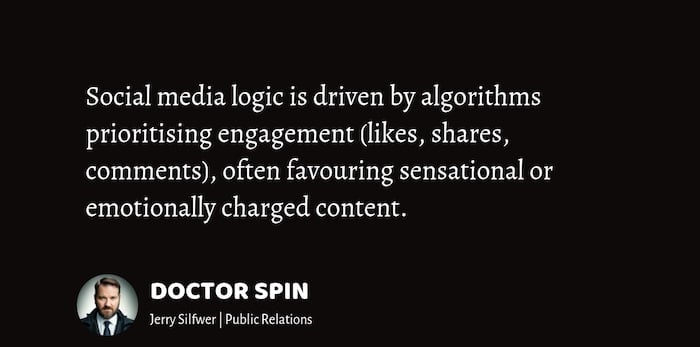“I’m quitting social media.”
The other day, I stumbled upon the article “Going Postal — A psychoanalytic reading of social media and the death drive.”
In the article, the writer Max Read tells us about his relationship with social media in light of reading “The Twittering Machine” by Richard Seymour.
And yes, Read tells us that he’s quitting social media.
Here we go:
Why Read Is Quitting Social Media
Read’s article is well-written, both poignant and entertaining. And he does a tremendous job of conveying his thinking on the subject. The trope “I’ve had enough, and here’s why I’m quitting social media” has been an internet staple for years, but Read’s take is a classy blend of wit and cool.
Despite disagreeing with Read’s conclusion, I enjoyed the style of the article wholeheartedly:
“I quit Twitter and Instagram in May, in the same manner I leave parties: abruptly, silently, and much later than would have been healthy. This was several weeks into New York City’s lockdown, and for those of us not employed by institutions deemed essential — hospitals, prisons, meatpacking plants—sociality was now entirely mediated by a handful of tech giants, with no meatspace escape route, and the platforms felt particularly, grimly pathetic.
Instagram, cut off from a steady supply of vacations and parties and other covetable experiences, had grown unsettlingly boring, its inhabitants increasingly unkempt and wild-eyed, each one like the sole surviving astronaut from a doomed space-colonization mission, broadcasting deranged missives about yoga and cooking projects into an uncaring void. Twitter, on the other hand, felt more like a doomed space-colonization mission where everyone had survived but we had to decide who to eat.”
The Reversal of Read’s Argument
My question: Aren’t the negatives just as bothersome for all types of media consumption?
For the sake of such an argument, imagine replacing social media with television in Read’s text:
“I quit watching television in May, in the same manner I leave parties: abruptly, silently, and much later than would have been healthy. This was several weeks into New York City’s lockdown, and for those of us not employed by institutions deemed essential — hospitals, prisons, meatpacking plants—reality was now entirely mediated by a handful of broadcast companies, with no meatspace escape route, and the shows felt particularly, grimly pathetic.
Day-time television, cut off from a steady supply of reality celebrities and cued studio audiences and other covetable experiences, had grown unsettlingly boring, its inhabitants increasingly unkempt and wild-eyed, each one like the sole surviving astronaut from a doomed space-colonization mission, broadcasting deranged missives about yoga and cooking projects into an uncaring void. Late-night television, on the other hand, felt more like a doomed space-colonization mission where everyone had survived but we had to decide who to eat.”
This type of media critique stems from a proud tradition all the way back to Neil Postman and Pierre Bourdieu. Such an observation doesn’t weaken the critique but hints that this isn’t a new phenomenon.
Don’t get me wrong; there are plenty of reasons for cutting back on television. My gosh, the amount of televised crap is staggering.
However, context does matter; if you think binge-watching daytime television instead of going to work and getting a healthy amount of exercise makes you worse, then you’re probably right.
There’s No Information Overload
If you’re unhappy with what you’re reading and seeing on Instagram and Twitter, you’re simply misusing them. The same goes for YouTube, Twitch, Quora, Pinterest, and TikTok.
Even Google’s search engine has a social component; stop searching for (and clicking on) crap, and the social media algorithm will better understand that you’re a serious person who wants serious search results.
“There is no information overload, only filter failure.”
— Clay Shirky
Quitting social media (or television) cold turkey isn’t necessarily the obvious solution to your problems.
I’m not actively trying to be an asshole here. There’s a case to be made that many people are ill-equipped to manage their social media feeds. Many of us don’t have the sensibilities to manage these “new” technologies — at least not yet.
I agree that the ecosystem with interconnected devices, big data, and dopamine-triggering notifications is more addictive and accessible than television ever. Just like television was so much harder to resist than radio.
You’re Not Supposed To React To Everything
In 1998, while playing around with my Nokia 1611 during class, my history teacher gently reminded me that the most significant disadvantage of being a slave was that they were always accessible.
Maybe this is a crucial point.
It might be that some generations have yet to understand that you’re not supposed to reply to all emails, comments, phone calls, text messages, and DMs. The mindset, ”Oh, I got a DM; it might be important,” will pull anyone into digital enslavement.
If you try to contact someone who isn’t paid to answer and you cannot pass through their filters, it’s not on the recipient for “not picking up”. It’s on you — the sender. If not, your inbox and your feeds will become everyone else’s agenda for your time — if you let it.
In our wired world, when anyone can so quickly contact anyone anywhere and at scale, it’s just different now. I even have a personal phone policy to that effect.
If you’re a Fortnite streamer using the Twitch social platform, there are built-in functions to allow the audience to pay for a chance of getting the streamer to notice your messages. And other social platforms (even Facebook) follow suit by implementing new ways for influencers to get paid.
We’ve gone from “Thanks for calling” to “Thanks for replying.”
Who’s the Bigger Fool?
This reversal might seem absurd to some, but the underlying logic is evident to most internet-savvy demographics.
Don’t get me wrong; this isn’t an older-people-just-don’t‑get-it rant. That would be unfair. Those who grew up without social media have no playbook and, more importantly, no older generations to learn from.
Max Read goes on to write:
“These people, with their just-asking questions and vapid open letters, are dullards and bores, pettifoggers and casuists, cowards and dissemblers, time-wasters of the worst sort.”
If this is true, and it might well be, what do we call those who allow time-wasters to invade their social feeds? I don’t have any big words, but fools come to mind.
We must manage our social feeds, DMs, and inboxes. Otherwise, they will manage us.

Thanks for reading. Please support my blog by sharing articles with other communications and marketing professionals. You might also consider my PR services or speaking engagements.
PR Resource: Social Media Sharing
Spin Academy | Online PR Courses
Why We Share on Social Media
“People want to be loved; failing that admired; failing that feared; failing that hated and despised. They want to evoke some sort of sentiment. The soul shudders before oblivion and seeks connection at any price.”
— Hjalmar Söderberg (1869−1941), Swedish author
When we share on social media, we share for a reason. And that reason typically has something to do with ourselves:
If you can get social media to work for you, great. But you should also be mindful not to let the pressure get the better of you.
“A status update with no likes (or a clever tweet without retweets) becomes the equivalent of a joke met with silence. It must be rethought and rewritten. And so we don’t show our true selves online, but a mask designed to conform to the opinions of those around us.”
— Neil Strauss, Wall Street Journal
Learn more: The Narcissistic Principle: Why We Share on Social Media
💡 Subscribe and get a free ebook on how to get better PR ideas.

PR Resource: Social Media Logic

Spin Academy | Online PR Courses
Social Media Logic
Media logic is a set of theories describing how the medium affects the media. Typically, the format (as the medium dictates) influences the mediated message.
“Media logic is defined as a form of communication, and the process through which media transmit and communicate information. The logic and guidelines become taken for granted, often institutionalized, and inform social interaction. A basic principle is that media, information technologies, and communication formats can affect events and social activities.“
Source: The International Encyclopedia of Political Communication 1Altheide, D. L. (2016). Media Logic. The International Encyclopedia of Political Communication, 1 – 6. https://doi.org/10.1002/9781118541555.wbiepc088
As famously stipulated by Marshall McLuhan, “The medium is the message.” What are the typical media logic effects on mediated messages?
Classic Media Logic Effects
Media logic is hypothesised to influence the news media in the following ways: 2Nord, L., & Strömbäck, J. (2002, January). Tio dagar som skakade världen. En studie av mediernas beskrivningar av terrorattackerna mot USA och kriget i Afghanistan hösten 2001. … Continue reading
The effects of the above media logic can also be recognised in social media. Still, social network algorithms seem to add even more effects:
Social Media Logic Effects
“Social media logic, rooted in programmability, popularity, connectivity, and datafication, is increasingly entangled with mass media logic, impacting various areas of public life.”
Source: Writing Technologies eJournal 3Dijck, J., & Poell, T. (2013). Understanding Social Media Logic. Writing Technologies eJournal. https://doi.org/10.17645/MAC.V1I1.70
Based on the suggested additions for social platforms, we can add four extra dimensions to the classic media logic effects model:
Social media logic seems entangled with classic media logic. While more complex, social networks seem to amplify the effects of classic media logic.
Learn more: Social Media Logic: The Amplification of Media Effects
💡 Subscribe and get a free ebook on how to get better PR ideas.

ANNOTATIONS
| 1 | Altheide, D. L. (2016). Media Logic. The International Encyclopedia of Political Communication, 1 – 6. https://doi.org/10.1002/9781118541555.wbiepc088 |
|---|---|
| 2 | Nord, L., & Strömbäck, J. (2002, January). Tio dagar som skakade världen. En studie av mediernas beskrivningar av terrorattackerna mot USA och kriget i Afghanistan hösten 2001. ResearchGate; Styrelsen för psykologiskt försvar. https://www.researchgate.net/publication/271014624_Tio_dagar_som_skakade_varlden_En_studie_av_mediernas_beskrivningar_av_terrorattackerna_mot_USA_och_kriget_i_Afghanistan_hosten_2001 |
| 3 | Dijck, J., & Poell, T. (2013). Understanding Social Media Logic. Writing Technologies eJournal. https://doi.org/10.17645/MAC.V1I1.70 |



